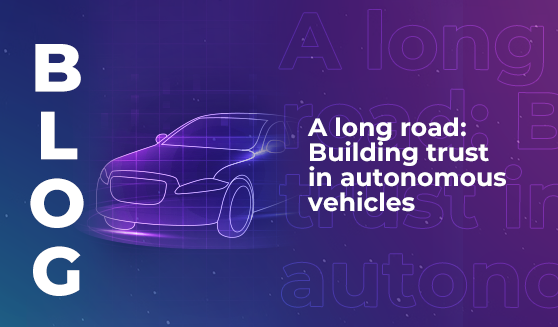
Why sustainability is the heart of the smart city revolution
The smart cities of the future will use tech to lower emissions, cut urban temperatures, and improve quality of life in highly populated areas.


Public trust in the safety and usefulness of autonomous vehicles is among the most important barriers to rolling out self-driving cars worldwide – and one of the most difficult obstacles to overcome.
In 2023, J.D. Power’s U.S. Mobility Confidence Index (MCI) study found that consumer confidence in autonomous vehicles had dropped to 37 out of 100 (a two-point decrease from the 2022 index score). The study also found that consumers don’t understand the differences between different levels of automation; suggesting that public education around AVs is inadequate, and increased understanding is needed to boost confidence.
A recent UK study asked the question: What type of vehicle would you feel safest travelling in?
The majority of respondents (almost two thirds) said they’d feel safest in a human-driven vehicle, while only one in six said they’d feel safest in an autonomous vehicle.
But research shows there are geographical and cultural differences in AV trust. In the UAE for example, 3M’s 2022 State of Science Index (SOSI) found that 89% of people are comfortable with the idea of travelling in self-driving cars.
In the UAE, that high level of trust in autonomous vehicles is thought to be related to another finding: that 88% of UAE residents trust scientists, and are eager to hear more about scientists’ work.
This is a really critical point to take into account in any discussion of AV adoption. Because trust in AVs doesn’t happen in isolation – it comes as part of a broader sense of trust in science, scientific research, and the reliability of technological testing methods.
A study published in the journal Scientific Reports in January 2024 found a positive correlation between scientific literacy and knowledge, and support for autonomous vehicles. Researchers used data from 4,112 individuals to explore the relationship between scientific literacy and public support for AVs, and found that those who were more supportive of AVs tended to have more objective knowledge about the science and technology behind them.
This link between knowledge and trust must be taken into account by tech developers and policy makers as they work on strategies to increase trust in autonomous vehicles in regions around the world – because it suggests that approach shouldn’t be targeted at AVs alone, but on a more holistic push towards widespread scientific literacy.
When we interviewed Helen Pan (General Manager at Baidu’s Apollo Open Platform), she said:
“Today's autonomous driving technology has crossed the watershed, and both Waymo and Baidu have entered the stage of fully driverless commercial operations. At this stage, in addition to technology, we are continuously expanding the scale of operation and reducing the cost. We need a sufficient number of vehicles to meet the constantly increasing demand of users. We will continue to expand the fleet size in the next two years.”
The technology is advancing rapidly, with the potential to revolutionise transport globally. But to enable that revolution to happen, the people who will use autonomous vehicles have to get on board and embrace their potential.
And that can’t happen without trust. We know that an understanding of the technology involved, along with real life experience of safe, user-friendly AVs, makes a significant difference to how people feel about stepping into a self-driving vehicle. So the science and technology communities need to keep making knowledge and experience as accessible as possible – to enable more of the public to feel comfortable that autonomous vehicles are as safe as (or safer than) human-operated cars.
Learn more about the latest developments in AVs at LEAP 2025.

The smart cities of the future will use tech to lower emissions, cut urban temperatures, and improve quality of life in highly populated areas.

Discover the cities that rank highly for smart city preparedness, and learn why locally relevant innovation is more important than cutting-edge tech.

If you’ve ever thought about becoming a tech investor, read this – learn why investors are the quiet force shaping the future of the industry.

The smart cities of the future will use tech to lower emissions, cut urban temperatures, and improve quality of life in highly populated areas.

Discover the cities that rank highly for smart city preparedness, and learn why locally relevant innovation is more important than cutting-edge tech.

If you’ve ever thought about becoming a tech investor, read this – learn why investors are the quiet force shaping the future of the industry.